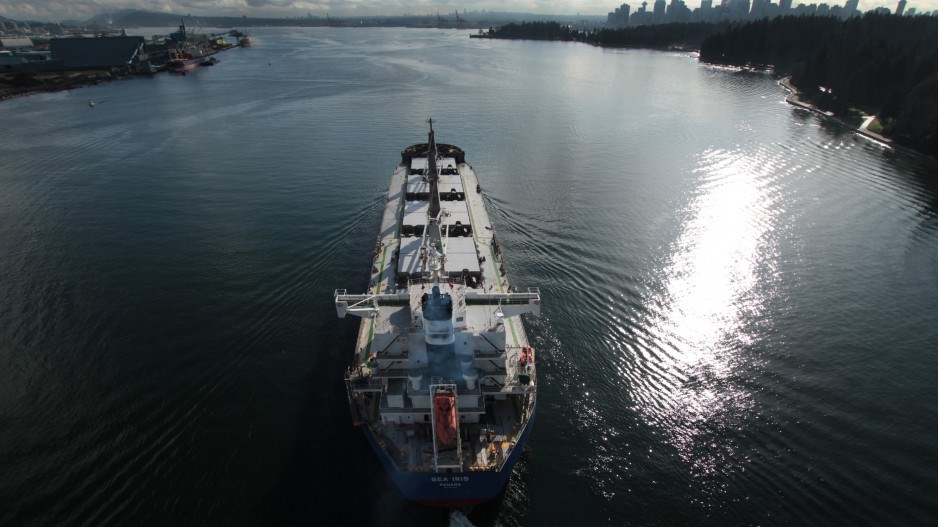Another international shipping industry authority is bullish on Vancouver’s prospects as a major global maritime centre.
Menon Economics’ 2017 Leading Maritime Capitals of the World report notes that, apart from No. 1-ranked Singapore, “no city has a more attractive policy framework than Vancouver” for aspiring international maritime centres.
The Oslo-based research institution’s overview of top maritime centres, which is published every two years, predicted future gains in the report’s rankings for Vancouver.
Eirik Handegard Dyrstad, report co-author and Menon analyst, said in an email to Business in Vancouver that “based on current order book status, the tax incentives, combined with governmental bodies that are highly supportive with respect to the maritime industry in the city (investments in infrastructure, etc.), we expect Vancouver to climb the ranking in the future.”
In its first inclusion in the Menon maritime centre report, Vancouver placed 24th out of 30 cities. The top five were Singapore, Hamburg, Oslo, Shanghai and London.
Menon’s report assesses regions in four maritime sectors: shipping, finance and law, technology and ports and logistics. Cities are also graded on their overall competitiveness and attractiveness to major shipping industry businesses. Menon surveys maritime experts for their insights. Approximately 250 participated in the 2017 report, which noted that, aside from its political stability and attractive business environment, Vancouver has a strategic Pacific Rim location, “a clear aspiration to become a global maritime HQ/management center through broad tax incentives for shipping and auxiliary services … and favourable policy framework, supportive government and attractive living conditions.”
Those tax incentives include exemptions on shipping operations, office and management activities and capital gains on the sale of vessels outside of Canada.
Earlier this year, Vancouver was featured in Deloitte’s EU Shipping Competitiveness Study as one of five “leading international shipping centres” used in the report’s comparative benchmarking analysis. The Deloitte study, released in late February, was commissioned by the European Community Shipowners’ Associations to provide data on the growing competitive threats to the European Union’s ports and to provide recommendations on how to retain and expand market share.
Vancouver scored well in the report’s regulatory, economic and political factors category.
The report also noted that government investment in maritime infrastructure and large public contracts for shipbuilding, which include Seaspan Shipyards’ $8 billion portion of Canada’s $38 billion national shipbuilding procurement plan, are helping rebuild B.C.’s technical maritime expertise. Much of that expertise was lost as major Metro Vancouver shipyards closed in the face of fierce offshore competition and government failure to deliver on major shipbuilding contracts such as Ottawa’s $500 million Polar 8 icebreaker, which was cancelled in 1990.
In Menon’s categories of shipping, which includes market value of shipping companies, and city attractiveness, which includes ease of doing business, transparency and entrepreneurship, Vancouver ranked 10th.
But the Menon and Deloitte reports pointed out that Metro Vancouver still lags far behind other shipping centres in local availability of the legal, finance, logistics, insurance, brokering, chartering and professional support services that are critical to success in the complex business of international shipping and cargo handling.
The city is also in an inconvenient time zone for trading with key markets in Europe and Asia and presents assorted complications for corporate executives and other workers in obtaining visas.
But Vancouver International Maritime Centre (VIMC) executive director Kaity Arsoniadis-Stein said Vancouver is making progress in attracting more of the expertise needed to support an international maritime centre and is already home to a number of industry front-runners.
Global shipping industry companies that have major offices in Metro Vancouver now include Seaspan Corp. (NYSE:SSW), Teekay Corp. (NYSE:TK), Pacific Basin Shipping Ltd. (HKG:2343), Mediterranean Shipping Co. and Methanex Corp.’s (TSX:MX) Waterfront Shipping Co. Ltd. The city is also home to international naval architects and designers like Robert Allan Ltd. and VARD Marine.
The mandate of the federally and provincially funded VIMC is to deepen Vancouver’s maritime industry talent pool by attracting more affiliate and branch offices and eventually more head offices of leading maritime industry companies to Metro Vancouver.
To that end, Arsoniadis-Stein noted that VIMC has helped attract prominent maritime law firm Norton Rose Fulbright and industry management and investment company Greystoke Marine Management.
She said the Menon report confirms that the maritime sector has a potential to expand and add value to Vancouver’s business environment.
“The future of global shipping is tied to Asia’s resource demands, and Vancouver offers the closest and most diversified port in the North American market.”
But Arsoniadis-Stein added that one of Vancouver’s main challenges in establishing itself as a leading global maritime city is raising awareness of its potential among politicians, administrators and the public.
“The maritime sector is long term and includes so much more than just ships.”
@timothyrenshaw




